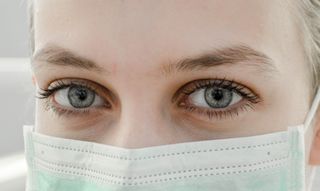Coronavirus Disease 2019
Why Your Doctor Is Not Panicking About Novel Coronavirus
COVID-19 is new, but there is a lot we already know.
Posted March 4, 2020 Reviewed by Gary Drevitch

Note: This article was written as a response to the attitudes present at the time of its writing in a rapidly evolving situation. New medical information emerges daily, and this post is not intended to offer medical advice.
Each day more cases of novel coronavirus, COVID-19, are reported in the U.S., and each day we feel more anxious. With the volume of information and the confusion about what’s true, it’s easy to panic. But your doctor isn’t panicking, and you don't need to, either.
We know more about COVID-19 than you think.
The way this epidemic is being reported highlights a sense of the unknown, and the unknown makes us anxious. It’s hard to stay calm when the director of the WHO is saying, “This is a unique virus, with unique features. This virus is not influenza. We are in uncharted territory.”
He’s right about that, and it’s alarming that the mortality statistics are looking higher than we initially hoped.
The executive director of WHO’s health emergencies program, Dr. Mike Ryan, has said, “Here we have a disease for which we have no vaccine, no treatment, we don’t fully understand transmission, we don’t fully understand case mortality, but what we have been genuinely heartened by is that unlike influenza, where countries have fought back, where they’ve put in place strong measures, we’ve remarkably seen that the virus is suppressed.”
So while we have hope that we can suppress the virus, there is still a lot we don’t know. But there is also a lot we do know. COVID-19 is a new virus in a well-known class of viruses. The coronaviruses are cold viruses. I’ve treated countless patients with coronaviruses over the years. In fact, we’ve been able to test for them on our respiratory panels for the entirety of my career.
We know how cold viruses work: They cause runny noses, sneezing, cough, and fever, and make us feel tired and achy. For almost all of us, they run their course without medication. And in the vulnerable, they can trigger a more severe illness like asthma or pneumonia.
Yes, this virus is different and worse than other coronaviruses, but it still looks very familiar. We know more about it than we don’t know.
Doctors know what to do.
Doctors know what to do with respiratory viruses. As a pediatrician, I take care of patients with hundreds of different viruses that behave similarly to this one. We take care of the kids at home and see them if the fever is prolonged, if they get dehydrated, or if they develop breathing difficulty. Then we treat those problems and support the child until they get better.
You know what to do.
You know what to do to avoid getting a cold: Wash your hands with soap and water for 20 seconds. Or rub vigorously with hand sanitizer when soap and water are not available. Cough into your elbow with a nice seal against your face. Don’t touch your face or your eyes and spread germs you may have touched with your hands.
You know how to take care of yourself when you have a cold: Drink lots of fluids and get some rest. Be kind to people who have medical problems. Just like if you have influenza, stay home and don’t spread it around.
And you know when to call your doctor. Based on your own health history, call your doctor’s office with concerns.
The kids are okay.
For parents, it’s crucial to know that kids are doing very well in this epidemic. In general, COVID-19 has been a mild illness in children. In other words, it’s a cold. Cases of more severe disease in children with this virus appear to be very rare based on the information we have now. The main issue is the way they could spread it to other people who are at higher risk. As always, call your child’s doctor if you are concerned that you are seeing serious symptoms in your child.
They are working on a vaccine.
Smart people are working on a vaccine for COVID-19. According to the CEO of Regeneron, their vaccine will likely be in testing by this summer.
Quarantines are slowing it down.
Our health departments and the CDC are on it. As we test and isolate patients with COVID-19, so far community spread has been kept to a slow rate. This is important because it keeps our hospitals ready to meet the needs of those who do become very ill.
Employers and schools are considering their plans if an outbreak develops in their area. Many are looking at work-at-home and learn-at-home options. The health departments in each state are actively at work.
It's scary to think that an invisible enemy is out there to make you sick. But your doctor is not panicking, and you don’t need to, either.




